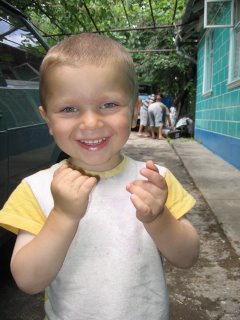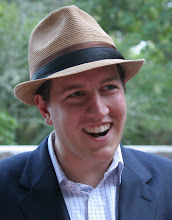Un alt sat: Partea intii
Sometimes I think that my life in my village of 2,500 people is small and dull, with few people and nothing to do. I recently found a place in Moldova that makes my village look like Manhattan.
Last week I visited my fellow Peace Corps volunteer Shawn's village of Rosietici, in Floresti county. Shawn and I have gotten along since the day we met, largely because of our sense of humor and because we've both spent considerable amounts of our lives in Boston; I was there for college, while Shawn was born and raised in Southie until he joined the Air Force at 18 and later went to college in Oklahoma. Despite our friendship, I had never visited his village. The opportunity presented itself while we were eating lunch in Chisinau and he invited me. I went, carrying with me only a toothbrush, a hairbrush and a stick of deodorant.
Just getting to Rosietici was a challenge. From Chisinau, we took a rutiera north toward Soroca. After two hours of travel, Shawn told the driver to stop and we got off. We stood on the side of the highway, from which a long road turned off and led to a village. The village at the end of that road was not Rosietici; in order to get to Rosietici, we started walking in the opposite direction, where there were no buildings in sight. Shawn had told me about the long walk to his village, but I was finally going to experience it.
We had been walking down the country road for about 10 minutes, during which time we had seen a single horse-drawn carriage and no cars, when Shawn pointed to the horizon and said, "You see the new church over there?"
I strained my eyes and could barely distinguish a building that rose slightly higher than the others. "Yeah, I see it."
"That's my village," he said.
"It doesn't look that far away," I said. "How long will it take to get there? Maybe another 15 minutes?"
"It looks close, doesn't it?" he said with a smile. "You'll see how long it really takes."
The church, Shawn told me, was the idea of a young man in the village. Several years ago, he had had a dream in which he went to a church located at that exact spot in the village. He took it as a sign from God to build the village's first church, and after years of fundraising and construction, he finally fulfilled his vision; the first ever service had been held a week earlier.
After a few more minutes on the road, Shawn turned to the side and started along a worn footpath through the middle of a field. I had just left the last paved road of my walk. We walked toward the distant image of the church, following the path and gulping water from our bottles under the blasting rays of the sun.
"One time I was walking home from the bus at night, and I lost the path," Shawn said. "I was lost for about a half-hour."
We continued to walk, now crossing some rocky terrain and a well-constructed bridge that would be suitable for cars to cross. I felt safe crossing this bridge, and didn't realize that I had always taken safety on bridges for granted. That would soon change.
We walked along pathways for another 10 minutes, until we came across another village built into the walls of a river gorge. Only several hundred people lived in the village, and many of them had dug their homes out of the steep hills, so in essence they were living in caves.
"Just think about it," Shawn said. "People started living here 400 years ago, and it's pretty much the same as it was back then. Sure, they have electricity and phones now, but not much else has changed."
We reached the river, where kids greeted "Mr. Shawn" while they swam near the bridge. The kids didn't attract my attention, however, as much as the bridge. It stretched about 20 meters across and stood only two meters over the water. It was constructed out of wooden planks about 30 cm wide, placed in sets of two or three planks lengthwise across the river so that you walked along the same pieces of wood for about four meters before moving to the next set of planks. The bridge was held together by metal cables, causing the bridge to dip and sway as you crossed it. There were also cables on the sides of the bridge, conceivably as handrails, but they were so low that I would have lost my balance stooping to grab one.
Shawn led the way across the bridge with confidence, talking to the swimming kids as he walked. I followed more gingerly, laughing nervously and silently wishing that Shawn would slow down so that the bridge wouldn't shake so much. I got halfway over the river, looked down, and saw the water passing under the planks of the swaying bridge as dizziness set in. I stopped, regained my composure, and then continued across the bridge.
As I stepped onto the opposite bank, I laughed and said to Shawn, "I figured I'd do something like that at some point in my Peace Corps service."
"What's funny is that a lot of time, babas (old ladies) go across on their hands and knees so that they won't fall in," Shawn said.
"I thought I was going to fall in, but I got by."
"In the Air Force, we always used to say there are two kinds of people," Shawn said. "There are people who have puked, and there are people who haven't puked yet. It's the same with that bridge; there are people who have fallen in, and there are people who haven't fallen in yet." Shawn finished his military service without ever throwing up, but he still has over a month left to fall in the river.
After crossing the river, we went up the other side of the gorge and, after 45 minutes of walking, finally reached Shawn's village of 500 people. I thought I knew a lot of people in my village, but in a place one-fifth the size of Mereseni, Shawn really does know everyone, and he had stories about every person we passed.
We arrived at Shawn's house and I met his host mom, Emilia, a retired elementary school teacher, and his host sister, Stela, a 28-year-old tailor. Shawn bought some beer from the store and drew some wine from the barrel in the cellar, and we drank as we ate dinner with his host family and two neighbors, one of them also a girl in her 20s. I joked that Shawn, Stela, the neighbor and I should all go the village discoteca, but I pulled out of the plans when they told me that the disco was a 45-minute walk and two villages away.
The six of us stayed up late talking, and when the neighbors left, Shawn and I went to his room and talked more. If we were in my village, I would haven undoubtedly played a movie or something on my computer. Shawn is one of the few volunteers without a computer, though, so we just talked; nothing particularly profound, but living in a village makes you appreciate a long, un-rushed conversation between friends, especially with Shawn's picks of Irish music playing in the background. At about midnight, I went to the guest room and went to sleep, hours away from my own bed, yet feeling at home in a Moldovan village not so different from my own.


